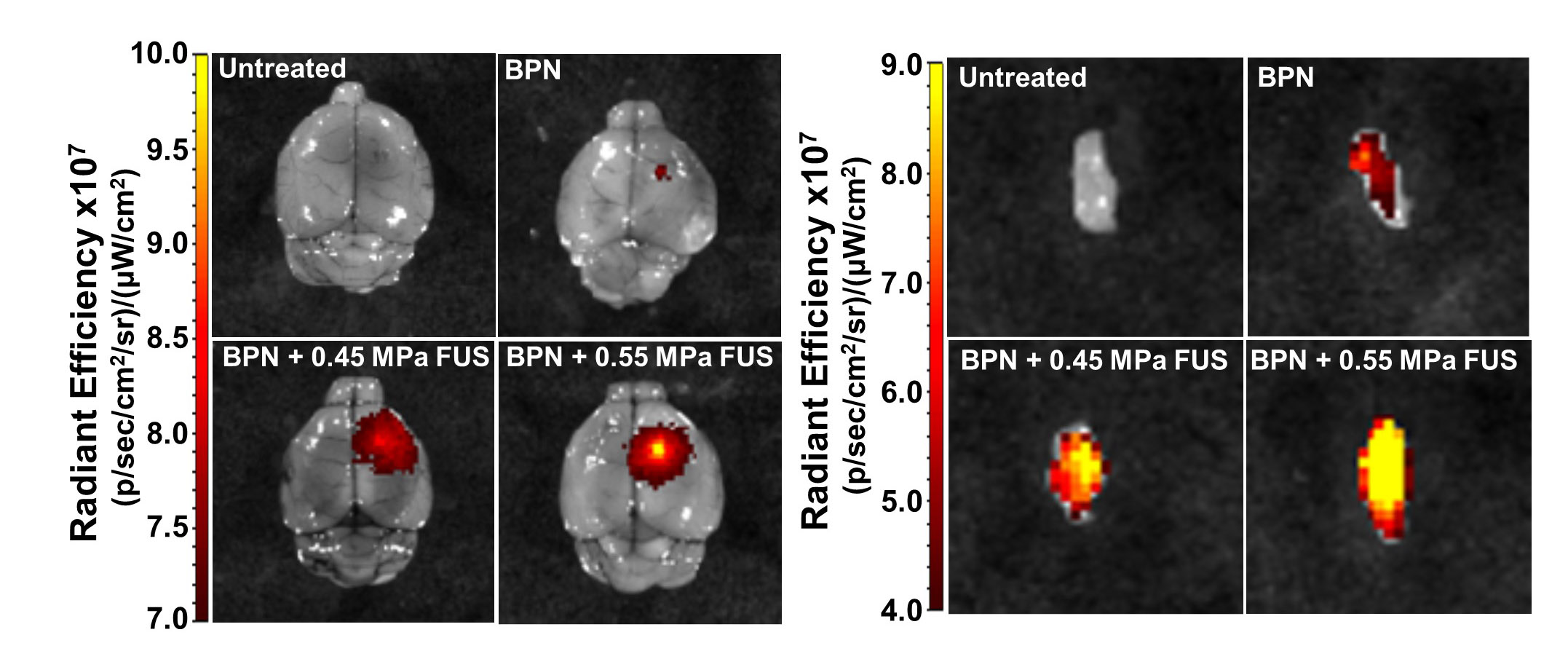 A collaborative research team led by Rich Price, PhD, at the University of Virginia and Justin Hanes, PhD, at Johns Hopkins University has published new, and somewhat unexpected, results from their preclinical nanoparticle gene delivery work.
A collaborative research team led by Rich Price, PhD, at the University of Virginia and Justin Hanes, PhD, at Johns Hopkins University has published new, and somewhat unexpected, results from their preclinical nanoparticle gene delivery work.
The group’s previous studies explored using focused ultrasound to open the blood-brain barrier (BBB) and deliver gene therapy to tumors deep inside the brain using nanoparticles. But recently, they discovered a secondary effect. After opening the BBB, the researchers noted an increase in fluid flow in the regions of the brain treated with focused ultrasound, and the increased fluid flow further distributed the nanoparticles throughout the tumor.
“What is exciting about these findings,” said Dr. Price, “Is that we discovered that focused ultrasound—based nanoparticle delivery is much better than we thought it could be for brain tumors and potentially other neurological applications. This is not a therapeutic study, but it reveals the transport mechanisms associated with gene delivery.”
 In Augmentation of Brain Tumor Interstitial Flow Via Focused Ultrasound Promotes Brain-penetrating Nanoparticle Dispersion and Transfection, the group measured this observation and found that the focused ultrasound—induced BBB opening increased the dispersion of directly injected brain-penetrating nanoparticles through tumor tissue by more than 100 percent. Because the brain tumor’s extracellular matrix usually hinders dispersion, this new-found mechanism of increasing interstitial tumor flow could play a critical role in improving gene transport after the genes are introduced to the tumors.
In Augmentation of Brain Tumor Interstitial Flow Via Focused Ultrasound Promotes Brain-penetrating Nanoparticle Dispersion and Transfection, the group measured this observation and found that the focused ultrasound—induced BBB opening increased the dispersion of directly injected brain-penetrating nanoparticles through tumor tissue by more than 100 percent. Because the brain tumor’s extracellular matrix usually hinders dispersion, this new-found mechanism of increasing interstitial tumor flow could play a critical role in improving gene transport after the genes are introduced to the tumors.
“This study is part of a progression that began with the Focused Ultrasound Foundation,” said Dr. Price. “The Foundation funded the initial study in this series, which allowed us to determine that focused ultrasound could assist in safely delivering drug-bearing nanoparticles across the BBB to brain tumors.”
Those results enabled Dr. Price and his team to earn follow-on funding in the form of a three-year Hartwell Foundation grant followed by full NIH funding.
“The work that Rich and his team have done is paving the way for many clinical advances in using focused ultrasound to reach targets in the brain,” said Foundation Chairman Neal F. Kassell, MD. “We are proud to have supported the early stages of this research, and we congratulate the team on building upon their results in innovative ways to better understand focused ultrasound’s potential.”
In October 2017, the Foundation presented Dr. Price with the inaugural Andrew J. Lockhart Memorial Prize. The award is given annually to an investigator who has already made outstanding contributions to the advancement of cancer treatment using focused ultrasound and who demonstrates great potential for further achievements in the field.
Related Stories
Research Roundup November 2019
Focused Ultrasound Gene Delivery System for Parkinson’s Disease Earns University of Virginia and Johns Hopkins $2.5M Grant June 2019
Investigator Profile: Richard Price, PhD October 2017
Lockhart Prize Awarded to UVA’s Richard Price October 2017
Research Roundup June 2017
Research Roundup April 2017
Research Roundup January 2016
Investigator Profile: Q&A with Justin Hanes, PhD June 2015
Investigator Profile: Q&A with Rich Price, PhD June 2015
UVA and Hopkins Collaborate to Use FUS to Deliver Nanoparticles into the Brain June 2015
Foundation’s First Research Award Recipient, Richard Price, Receives $3.3 Million in Follow On Funding from the NIH March 2012
